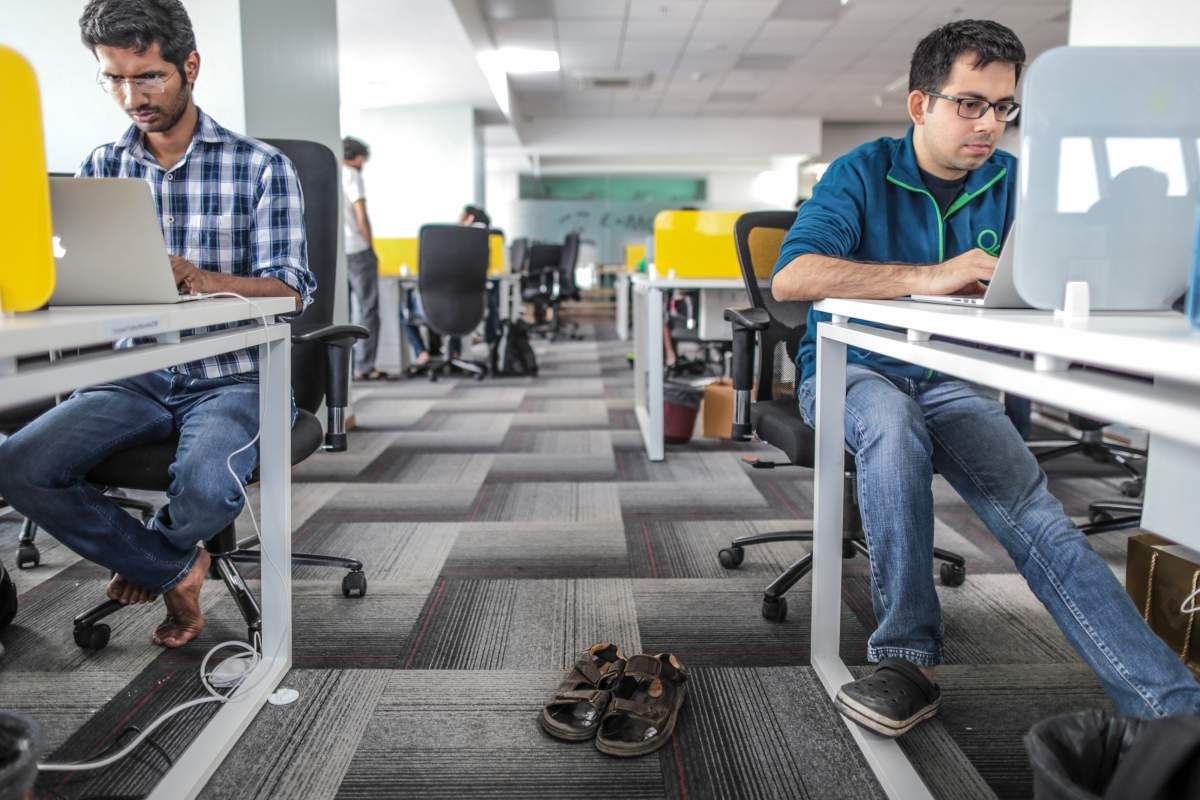In an ever-evolving landscape of business, unique opportunities arise that redefine how organizations operate. As technology advances and societal needs shift, an array of specialized roles is emerging, driving change and facilitating growth. These positions are not only addressing contemporary challenges but also paving the way for novel approaches to problem-solving.
As companies navigate through complexities, the demand for specific skill sets is surging, leading to a dynamic workforce that blends creativity, technical expertise, and strategic insight. This blend of competencies is essential for organizations aiming to thrive in competitive environments, enabling them to harness new technologies and methodologies effectively.
Fostering innovation and agility, these groundbreaking roles will play a crucial part in shaping the next wave of business initiatives. By embracing these changes, businesses can position themselves at the forefront of industry advancements, ultimately enhancing their capability to adapt and succeed.
Revolutionary Roles Shaping Startup Landscapes
Innovative positions are emerging that are redefining organizational dynamics and operational efficiencies. These roles are not just additions to existing teams; they represent a shift in how businesses approach challenges and capitalize on opportunities. As technology evolves and market demands shift, these new functions are crucial in navigating the complexities of today’s economy.

Data Narrative Designer is a role increasingly sought after, focusing on the art of storytelling through analytics. Professionals in this category blend creativity with data science, crafting compelling narratives that inform decision-making and drive strategic initiatives. By translating numbers into meaningful insights, they empower teams to make informed choices backed by data-driven evidence.
Customer Experience Innovator stands at the forefront of enhancing consumer interactions. This position is dedicated to reimagining how organizations engage with their audience, ensuring that every touchpoint is aligned with customer needs and aspirations. By employing user-centered design principles, these innovators help build lasting relationships between brands and their clients.
Sustainability Strategist reflects the growing importance of eco-conscious practices in business. This role involves creating and implementing strategies that prioritize environmental responsibility while balancing economic goals. Individuals in this capacity drive initiatives that not only enhance corporate image but also contribute positively to society and the environment.
As the competitive landscape evolves, the rise of these avant-garde roles signifies a pivotal change in how businesses operate and succeed. Organizations that embrace these innovative positions are better equipped to thrive amidst ever-changing market dynamics.
Innovative Skills for Tomorrow’s Entrepreneurs
As the landscape of business continues to evolve, it becomes vital for individuals entering this realm to acquire a unique set of capabilities. These competencies will enable them to navigate complexities and seize opportunities in dynamic markets. Understanding the need for adaptation and growth is crucial for those aspiring to lead in contemporary business environments.
Essential Competencies
Prospective leaders should focus on a variety of skills that empower them to excel:
- Creative Problem Solving: The ability to approach challenges with an open mind and generate innovative solutions.
- Digital Literacy: Proficiency in utilizing technology and digital platforms to enhance operations and marketing.
- Emotional Intelligence: Understanding and managing one’s emotions and the emotions of others to foster collaboration.
- Agility in Decision Making: The capability to make informed choices swiftly in response to changing circumstances.
Strategic Mindsets
Beyond hard skills, adopting particular mindsets can greatly enhance one’s effectiveness:
- Growth Mindset: Embracing challenges and viewing failures as opportunities for learning.
- Collaboration: Valuing teamwork and diverse perspectives as essential for fostering innovation.
- Customer-Centric Focus: Prioritizing the needs and feedback of customers in order to refine products and services.
- Sustainability Awareness: Incorporating environmentally conscious practices into business strategies for long-term viability.
By honing these abilities and perspectives, aspiring business leaders will be well-equipped to thrive in an ever-changing atmosphere and inspire others on their journeys.
The Rise of Data Science Specialists
In recent years, a significant shift has occurred in various industries, highlighting the importance of analytical expertise. As organizations increasingly rely on data-driven insights, professionals skilled in interpreting complex datasets are becoming indispensable. This trend reflects a growing recognition of the value that data can bring to decision-making processes and overall business strategies.
The demand for individuals proficient in statistical analysis, machine learning, and algorithm development has surged. Companies are seeking experts who can not only extract meaningful information from raw data but also present findings in a way that influences key stakeholders. This skill set empowers organizations to enhance their operational efficiencies and refine their customer interactions.
Moreover, the roles of these specialists are continuously evolving, with an emphasis on interdisciplinary knowledge. Proficiency in programming languages, as well as familiarity with statistical methodologies, are now seen as essential components of their toolkit. As the landscape evolves, so too does the expectation that these professionals will collaborate across departments, ensuring that data insights align with organizational goals.
Consequently, educational institutions are adapting their curricula to meet this growing need. Programs focused on data analysis, big data technologies, and computational statistics are on the rise, preparing the next generation of analysts with the skills required to thrive in this dynamic environment. As awareness of data’s potential continues to expand, the role of these specialists will undoubtedly play a pivotal part in shaping innovative business practices.
Sustainability Experts: A New Necessity
In today’s rapidly changing environment, the pursuit of ecological balance is becoming indispensable for enterprises. Organizations face increasing pressures to adopt practices that not only meet current demands but also safeguard the planet for generations to come. As awareness surrounding climate change and resource depletion rises, the role of individuals skilled in sustainable practices gains paramount importance.
These specialists bring a wealth of knowledge and innovative strategies to the table, offering solutions that align economic growth with environmental stewardship. Their influence extends across various sectors, helping businesses navigate compliance, reduce their carbon footprint, and engage in responsible resource management.
- Identifying and implementing green technologies
- Developing sustainable supply chain practices
- Conducting environmental impact assessments
- Engaging stakeholders in responsible initiatives
- Promoting circular economy principles
As entities aim to enhance their brand integrity and pursue social responsibility, the demand for these knowledgeable individuals is projected to escalate. Their expertise not only supports compliance with regulations but also fosters innovation, opening avenues for new market opportunities.
- Adapting to consumer expectations for sustainability
- Enhancing operational efficiency through eco-friendly practices
- Building resilience against potential environmental risks
Ultimately, incorporating skilled professionals focused on sustainability is not merely beneficial; it is essential for thriving in an evolving marketplace where ecological considerations are paramount. The collaboration between visionary leaders and dedicated sustainability experts will pave the way for responsible, lasting growth in an interconnected world.
Creative Technologists in Digital Startups
In today’s fast-paced technological landscape, a unique synergy between artistry and engineering is becoming increasingly vital. This harmonious blend enables organizations to craft innovative solutions that resonate with users on multiple levels. As a result, a new type of professional has emerged, driven by a desire to push boundaries and enhance user experiences through inventive approaches.
These individuals play a crucial role in bridging the gap between creativity and technology, allowing for a more integrated perspective on product development. Their expertise spans various fields, merging multiple disciplines to create engaging and functional digital experiences. Here are some key characteristics that define their contribution:
- Interdisciplinary Skills: They possess knowledge in both creative and technical domains, fostering collaboration across teams.
- User-Centric Approach: Prioritizing the end-user, they ensure that solutions not only look good but also provide meaningful functionality.
- Innovative Thinking: By challenging traditional methodologies, they cultivate a culture of experimentation and new ideas.
- Adaptability: These professionals can swiftly adjust to the evolving demands of technology and design trends.
As companies navigate an increasingly competitive digital ecosystem, the involvement of creative technologists becomes indispensable. Their ability to envision and realize innovative concepts will be a pivotal aspect of driving progress and achieving success. Embracing their multifaceted skill sets will empower organizations to stand out and engage their audiences more effectively.
Cybersecurity Professionals for Growing Ventures
With the rapid expansion of innovative enterprises, safeguarding digital assets has become a paramount concern for many organizations. The increasing reliance on technology has led to a surge in vulnerabilities, making it essential for businesses to prioritize protective measures. Highly skilled individuals dedicated to security strategies play a crucial role in ensuring that these ventures can thrive without compromising sensitive information.
As digital threats evolve, the demand for knowledgeable experts capable of countering these risks intensifies. Organizations are recognizing that investing in security is not merely a precaution but a vital component of long-term success. By integrating proficient specialists into their teams, companies can establish robust frameworks designed to thwart potential breaches and maintain customer trust.
The collaboration between innovation and security fosters an environment where creativity can flourish without apprehension. These adept individuals not only implement protective measures but also educate teams on best practices, creating a culture of security awareness. Consequently, businesses can pursue their goals with confidence, knowing they have fortified their defenses against cyber threats.
AI and Automation: Transforming Workforces
The integration of intelligent systems and mechanized processes is reshaping how organizations operate, leading to significant changes in workforce dynamics. This shift not only enhances productivity but also redefines roles, enabling individuals to focus on more strategic and creative tasks. As technology continues to evolve, its impact on labor markets and organizational structures becomes increasingly profound.
Impact on Job Roles
As automated systems take over routine tasks, various job functions are undergoing significant modifications. Here are some notable trends:
- Reduction in repetitive manual work, leading to higher efficiency.
- Creation of positions that require collaboration between humans and machines.
- Shift towards roles that demand advanced problem-solving abilities and emotional intelligence.
- Opportunities for continuous learning and skill development in new areas.

Benefits of Automation
The adoption of AI and automation yields numerous advantages for businesses and their workforce:
- Increased Efficiency: Streamlined processes reduce time and resource expenditure.
- Improved Accuracy: Automation minimizes errors associated with manual tasks.
- Enhanced Innovation: Employees are freed from mundane responsibilities, allowing them to focus on innovative solutions.
- Cost Savings: Organizations can allocate resources more effectively and reduce operational costs.
As organizations embrace these changes, the collaborative synergy between human talent and advanced technologies will be crucial in navigating this evolving landscape.
Questions and answers: Professions That Will Soon Appear in Startups
What are some of the emerging professions that are expected to transform startups in the near future?
Some emerging professions that are expected to significantly impact startups include AI ethicists, remote experience designers, blockchain developers, sustainability consultants, and data storytellers. AI ethicists will help startups navigate the ethical implications of implementing artificial intelligence in their products, while remote experience designers will focus on creating engaging remote work environments. Blockchain developers will be crucial for businesses looking to integrate decentralized technologies, and sustainability consultants will assist startups in implementing eco-friendly practices. Lastly, data storytellers will play a vital role in helping companies make data-driven decisions by presenting insights in a compelling narrative format.
How can startups benefit from hiring specialists in these emerging professions?
By hiring specialists in these emerging professions, startups can gain competitive advantages in several ways. For instance, AI ethicists can ensure that AI solutions are developed responsibly, potentially preventing costly ethical missteps. Remote experience designers can enhance team collaboration and productivity, which is especially important in the increasingly common remote work environment. Blockchain developers can create secure and transparent systems that foster trust with customers. Sustainability consultants can help reduce carbon footprints and comply with regulations, appealing to eco-conscious consumers. Meanwhile, data storytellers can synthesize complex data into actionable insights, aiding in better decision-making and strategy development.
What skills should aspiring professionals in these emerging fields develop?
Aspiring professionals in these emerging fields should focus on a mix of technical and soft skills. For example, AI ethicists should have a solid understanding of both artificial intelligence technologies and ethical frameworks. Remote experience designers should work on design thinking and user experience (UX) skills, combined with excellent communication abilities to interact effectively with remote teams. Blockchain developers must be proficient in programming languages related to blockchain technology, such as Solidity, as well as understand cryptographic principles. Sustainability consultants should develop expertise in sustainable practices and regulations, coupled with strong project management skills. Finally, data storytellers should hone their analytical skills alongside storytelling and visualization techniques to convey insights effectively.
What challenges might startups face when integrating these emerging professions into their teams?
Startups may encounter several challenges when integrating these emerging professions. Firstly, there may be a scarcity of qualified candidates in these specialized fields, making it difficult to find individuals who possess the necessary skills and experience. Additionally, startups often have limited budgets, so attracting top talent can be challenging. There’s also the potential for organizational resistance to change, as existing team members may be hesitant to adopt new roles or technologies. Furthermore, the rapid evolution of these fields means that ongoing training and upskilling will be necessary, which can strain resources. Lastly, aligning the goals of these new roles with the startup’s vision can require careful strategic planning and communication.
How will the rise of these professions change the overall landscape of the startup ecosystem?
The rise of these emerging professions will likely lead to a more innovative, responsible, and competitive startup ecosystem. As startups embrace AI and blockchain technologies, we’ll see increased efficiency and transparency in operations and customer interactions. The focus on remote experience design will foster inclusive workplaces that can attract talent from diverse geographical locations. Sustainability consultants will drive startups towards more environmentally friendly practices, resonating with consumers who prioritize ethical consumption. Additionally, data storytelling will create a more data-driven culture within startups, allowing them to adapt quickly to market changes. Overall, these emerging professions will contribute to a startup culture that values ethical considerations, collaboration, sustainability, and informed decision-making, ultimately shaping a new generation of successful businesses.
What are the key responsibilities of a software engineer in a startup job focused on artificial intelligence in 2024?
In a startup job as a software engineer focused on artificial intelligence in 2024, responsibilities include designing and implementing machine learning software, collaborating with cross-functional teams to ensure scalable solutions, mentoring junior engineers, and leading the development of new features. The role requires strong coding skills and the ability to leverage business intelligence and cloud technologies to meet business objectives.
What is the role of an account executive in driving sales for tech companies in 2024?
An account executive in tech companies is responsible for driving sales by building strategic partnerships, managing the sales pipeline, and collaborating with cross-functional teams to ensure alignment with business objectives. This role requires strong communication skills and the ability to collaborate with various teams such as customer success, information technology, and cybersecurity to ensure customer satisfaction and growth.
What are the key qualifications for a senior software engineer working on machine learning software in 2024?
A senior software engineer working on machine learning software in 2024 must have expertise in artificial intelligence, strong coding skills, and experience in designing scalable systems. The role also involves overseeing the development process, collaborating with cross-functional teams to solve complex business challenges, and mentoring junior engineers. Experience in cloud and cybersecurity is often required.
How does a manager lead a cross-functional team in tech to develop and implement new features?
A manager in tech leads cross-functional teams by developing strategies that align with business objectives, ensuring clear communication between departments, and managing the design and implementation of new features. The manager will lead collaboration efforts across software, information technology, and salesforce teams to ensure that all technical and business requirements are met.
What responsibilities does an information security analyst have in a tech company in 2024?
An information security analyst in 2024 is responsible for ensuring cybersecurity by overseeing risk management processes, implementing security protocols, and collaborating with various teams such as information technology and business intelligence. The analyst works to ensure compliance with security regulations and plays a key role in protecting the company’s sensitive data from cyber threats.








